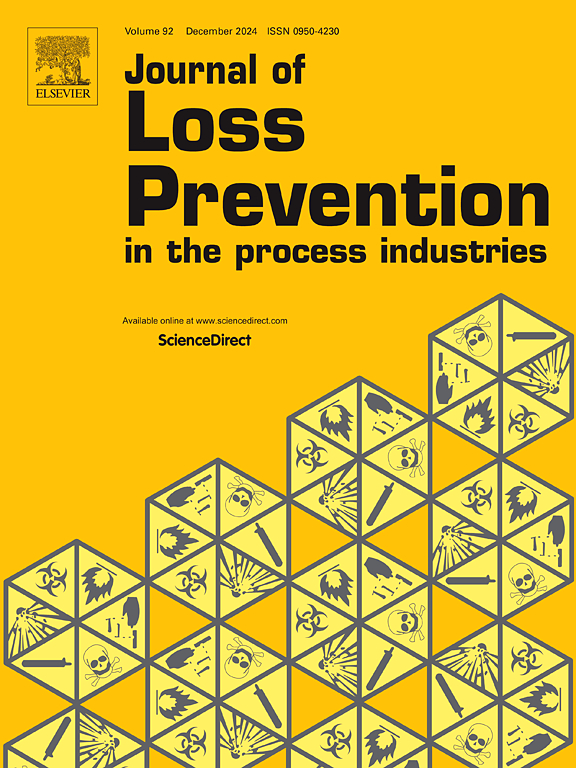Risk analysis of urban low-pressure natural gas networks based on hybrid dynamic Bayesian networks
IF 3.6
3区 工程技术
Q2 ENGINEERING, CHEMICAL
Journal of Loss Prevention in The Process Industries
Pub Date : 2025-04-11
DOI:10.1016/j.jlp.2025.105649
引用次数: 0
Abstract
With the accelerating pace of urbanization, natural gas has become an increasingly vital component of urban energy supply due to its status as a clean energy source. As the "last mile" of gas transportation, the reliability of low-pressure natural gas pipeline networks directly affects both the quality of life for urban residents and public safety. However, these networks face numerous uncertainties, such as equipment aging, environmental changes, and operational errors, all of which pose significant safety risks. To effectively assess the risk level of urban natural gas networks and enhance their reliability, this paper proposes a risk analysis approach based on a hybrid Dynamic Bayesian Network for urban low-pressure natural gas pipeline systems. First, failure data from an urban low-pressure network is statistically analyzed to identify operational characteristics and potential failure factors, leading to the establishment of a comprehensive risk analysis index system. Then, combining the dynamic Bayesian network model with an improved failure probability model with historical accident data, real-time monitoring data, and expert experience, the proposed approach dynamically updates the network's safety status, predicting the failure probability trend over future time periods and tracing critical weak points in the network. Furthermore, through an integrated reliability evaluation, targeted optimization strategies and improvement measures are proposed to ensure the long-term safe and stable operation of the low-pressure natural gas network. This study provides theoretical support and technical solutions for enhancing the safety and reliability of urban natural gas pipeline systems.
基于混合动态贝叶斯网络的城市低压天然气管网风险分析
随着我国城市化进程的加快,天然气作为一种清洁能源,已成为城市能源供应中越来越重要的组成部分。作为天然气输送的“最后一公里”,低压天然气管网的可靠性直接影响到城市居民的生活质量和公共安全。然而,这些网络面临着许多不确定性,如设备老化、环境变化和操作错误,所有这些都构成了重大的安全风险。为有效评估城市天然气管网风险水平,提高管网可靠性,提出了一种基于混合动态贝叶斯网络的城市低压天然气管道系统风险分析方法。首先,对某城市低压管网的失效数据进行统计分析,识别运行特征和潜在失效因素,建立综合风险分析指标体系。然后,将动态贝叶斯网络模型与改进的故障概率模型结合历史事故数据、实时监测数据和专家经验,动态更新网络的安全状态,预测未来一段时间内的故障概率趋势,跟踪网络的关键弱点。通过综合可靠性评估,提出有针对性的优化策略和改进措施,确保低压天然气网络长期安全稳定运行。本研究为提高城市天然气管道系统的安全性和可靠性提供了理论支持和技术解决方案。
本文章由计算机程序翻译,如有差异,请以英文原文为准。
求助全文
约1分钟内获得全文
求助全文
来源期刊
CiteScore
7.20
自引率
14.30%
发文量
226
审稿时长
52 days
期刊介绍:
The broad scope of the journal is process safety. Process safety is defined as the prevention and mitigation of process-related injuries and damage arising from process incidents involving fire, explosion and toxic release. Such undesired events occur in the process industries during the use, storage, manufacture, handling, and transportation of highly hazardous chemicals.

 求助内容:
求助内容: 应助结果提醒方式:
应助结果提醒方式:


